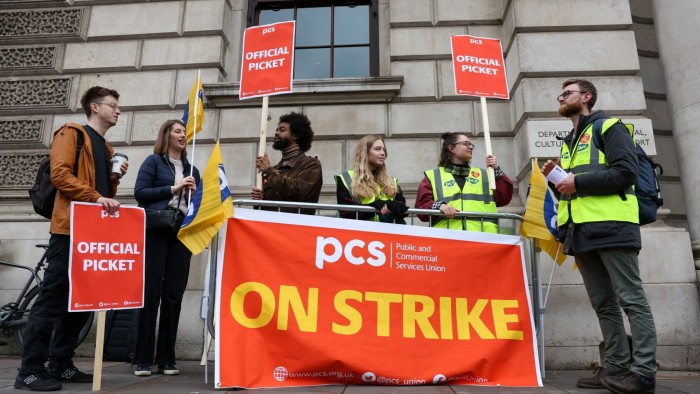Civil service reform must tackle pay and promotion

This article is an on-site version of our Inside Politics newsletter. Subscribers can sign up here to get the newsletter delivered every weekday. If you’re not a subscriber, you can still receive the newsletter free for 30 days
Good morning. Barring some crisis or row that it would be eccentric to overlook, I thought I’d spend this week discussing in more detail the policy questions the Labour government needs to grapple with, if it wants to meet its refined objectives. Today: some thoughts on civil service reform, specifically civil service pay.
Inside Politics is edited by Georgina Quach. Read the previous edition of the newsletter here. Please send gossip, thoughts and feedback to [email protected]
Freeze and squeeze
What’s the easiest way to control government spending, or at least give the appearance of doing so? Freeze wages, because the saving multiplies over time but it results in fewer media headlines than cutting roles does. And what’s the easiest way to raise revenue? Freeze the thresholds at which people begin to be eligible for higher rates of income tax, because it doesn’t attract the headlines or the rows that simply increasing income tax does.
But over the long term, both these policies create bad incentives. And taken together they create some nasty unintended difficulties.
For instance, the wage freeze means that doctors’ pay has been further eroded compared with other members of the OECD, which is one reason why we have a retention problem in the NHS. These salaries have always been relatively low compared with our peers, as the structure of the health service is “good” at suppressing clinical pay. Added to that, freezes in the threshold raise now mean that many people on what are by no reasonable definition large salaries are now being taken into the 40p higher rate band of income tax.
These two come together in a really unhelpful way on Whitehall: the pay freeze has reduced civil service pay relative to the private sector. That is particularly acute in roles that are going to be very important if the government wants to seize the benefits of machine learning and digital transition.
Now, it’s true to say that the civil service and public sector still offer much more generous pension schemes than most private sector employers. But it’s equally true, and more important from a recruitment and retention perspective, that most people at the start of their careers do not put all that much thought into pension schemes (this is why the introduction of “opt-out” pension schemes was a good thing!), and not as many people think about it in mid-career as they perhaps should either.
Once people are within the civil service, the best way to get a pay rise is to get promoted, which usually involves moving departments, which means that the civil service does not have as much institutional memory within departments as it ideally would.
If you want to improve how the civil service operates, you have to change these incentives around pay and promotion. That might involve some very tricky political battles over the balance between pay settlements today and your eventual pension scheme. It might require some structural changes to how promotion and pay increases in the senior civil service are secured. But one way or another, the government needs to be willing to do one or both of those things.
Now try this
I saw the revival of Matthew Bourne’s Swan Lake at Sadler’s Wells this weekend. It’s excellent (still!). You can listen to the recording of Swan Lake (the 1976 André Previn/LSO version) here.
Top stories today
-
Reset talks | The EU is drawing up tough red lines for its coming “reset” negotiations with the UK, according to internal discussion documents. Brussels is demanding an early deal on fishing rights and reiterating the “no cherry-picking” principles the European Commission set out in 2017 for dealing with the UK. Today Rachel Reeves will lay the ground in Brussels for an “ambitious” new economic partnership with the EU, when she promises to fully honour post-Brexit deals struck by the last Conservative government.
-
UK considering stance on Hayat Tahrir al-Sham | The UK’s Cabinet Office minister has said the government is “quickly” considering its stance on the Islamist group that toppled the Assad regime, which is proscribed by the UK as a terrorist organisation, and that the immediate future in Syria is “very uncertain”.
-
All builder, no filler | Local council committees would be bypassed on planning decisions to prevent “damaging delays” to building homes, prisons and infrastructure under proposals to be put forward by Keir Starmer as he seeks to reach ambitious housebuilding targets.
-
Tech staff rolled in for civil service reform | Ministers will try to recruit start-up workers in the tech industry on six to 12-month “tours of duty” to deliver Keir Starmer’s “plan for change”, the Times’ Matt Dathan reports.
Recommended newsletters for you
White House Watch — Your essential guide to what the 2024 election means for Washington and the world. Sign up here
FT Opinion — Insights and judgments from top commentators. Sign up here
#Civil #service #reform #tackle #pay #promotion




